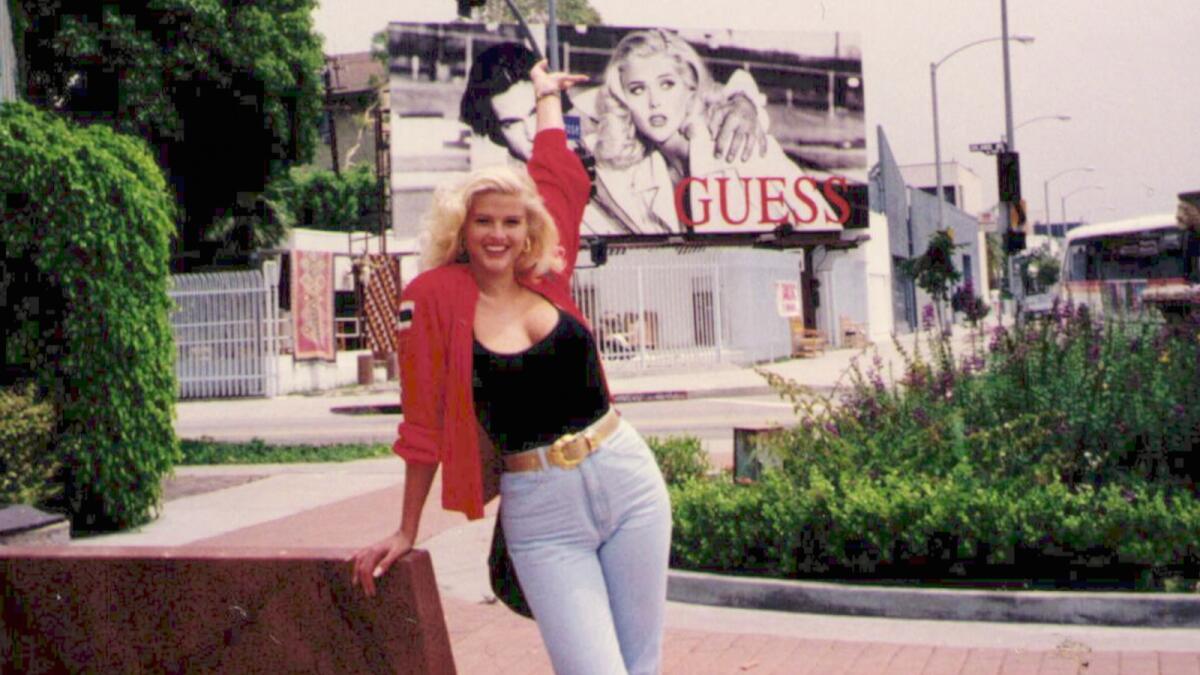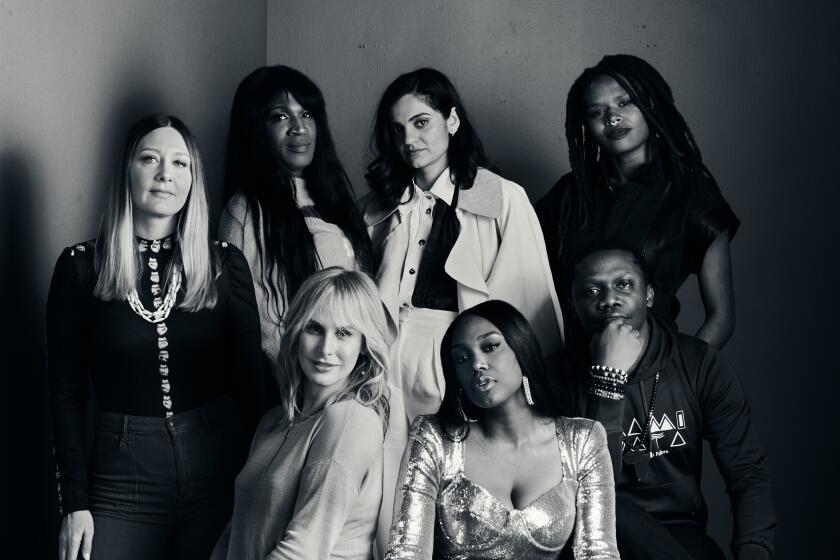Review: The unreal lives of Anna Nicole Smith and NYC’s socialite ‘It Girls’

- Share via
‘Anna Nicole Smith: You Don’t Know Me’
Director Ursula Macfarlane’s biographical documentary “Anna Nicole Smith: You Don’t Know Me” is another in the recent wave of “reputation rehab” docs in which women whose lives and careers were treated as punchlines a decade or two ago are given a more compassionate second look. Smith was definitely one of those ladies — like Britney Spears and Pamela Anderson — who was ridiculed by comedians and gossip columnists for her flamboyant party girl lifestyle. But according to the people who knew her best, the truth about Smith was more complicated.
Because Smith was all over television in the 1990s, Macfarlane can tell her story mostly via old interview footage and home movies, supplemented with new insights from Smith’s friends and colleagues. The film traces Smith’s rise from a rough Texas childhood to a thriving career as a model, and then ultimately to her years as a tabloid staple, infamous for her drug problems and her unconventional relationships. Smith undeniably had a presence in front of the camera, using her curvy body and cooing voice to recall the heyday of Marilyn Monroe and Jayne Mansfield. But rather than nurturing a career as an actress, she quickly became the kind of celebrity who was famous just for being famous — which may have burned her out more quickly. (Smith died in 2007.)
“You Don’t Know Me” doesn’t try to make the case that Smith was some great talent; and Macfarlane doesn’t ignore the sketchiness of her marriage to a sickly old oil tycoon. But neither does Macfarlane let the showbiz press off the hook for mocking Smith and feeding her insecurities, rather than appreciating her. This is an in-depth film about a person many presumed had no depth at all. It’s a cautionary tale — not just for future sex symbols, for those who write about them.
‘Anna Nicole Smith: You Don’t Know Me.’ TV-MA ,for child abuse references, language, nudity and sexual violence references. 1 hour, 56 minutes. Available on Netflix.

‘Queenmaker: The Making of an It Girl’
Who’s ready for some 2000s nostalgia? The documentary “Queenmaker: The Making of an It Girl” drops viewers back into the high-end New York social scene of 15 to 20 years ago, when young heiresses like Paris Hilton, Tinsley Mortimer and Olivia Palermo were being photographed at parties nearly every night and then written about the next day by bloggers who turned their lives into a soap opera. Director Zackary Drucker covers the vibe of those times, which spawned reality TV shows and the early seasons of “Gossip Girl.” Drucker also talks to the journalists who became quasi-celebrities themselves, thanks to the lively way they captured their subjects.
The film’s primary focus is on the founder of the blog Park Avenue Peerage, who at the time was an Illinois college student, watching the glamorous people from afar. What happens to that blog’s author — who later had a tumultuous transition from male-identifying to female-identifying — marks a shift in tone for “Queenmaker,” which in its last half-hour documents the troubled times faced by some of the socialites and by fame-obsessed websites like Gawker. There’s a bit of a bait-and-switch involved in Drucker’s approach; and on the whole, the film’s balance between the celebrities and the wannabes doesn’t do full justice to either. But there’s a strong point of view here, as Drucker scrutinizes an era that established a lot of the codes and aspirations of our own influencer-saturated times.
‘Queenmaker: The Making of an It Girl.’ Not rated. 1 hour, 23 minutes. Available on Hulu.
To commemorate next year’s 40th edition of the Sundance Film Festival, we’re spending 12 months looking at the lives of 7 members of this year’s class.
‘Film: The Living Record of Our Memory’
The sort of cinephile who would watch a documentary called “Film: The Living Record of Our Memory” is probably already familiar with — and friendly to — director Inés Toharia’s message about the importance of preserving old movies. But this film is still a treat for true buffs, both because of the wealth of rare old footage Toharia includes and the comprehensive approach she takes to the technical concerns and cultural variations that make cinema archiving complicated. “The Living Record” covers the history of preservation, from the days when film studios routinely threw away prints to today, when they have too much faith in unstable digital elements. Looking well beyond Hollywood, Toharia considers how the politics and economics of other countries affect what gets kept. Though a bit overlong and lacking a strong structure, this frequently fascinating documentary nevertheless shows how cultural ephemera can bring the past to life, in ways both instructional and inspirational.
‘Film: The Living Record of Our Memory.’ Not rated. 1 hour, 59 minutes. Available on VOD.
Also on VOD
“The Quiet Epidemic” examines the current state of the research into chronic Lyme disease, a condition that many in the medical community still won’t recognize. Directors Winslow Crane-Murdoch and Lindsay Keys cover the history of the debate over CLD in a general way; and they also give the phenomenon a more human dimension by following the stories of two patients across several years as they fight to be believed. Available on VOD.
“Assassin Club” stars Henry Golding as a hired killer who gets drafted into a game he didn’t ask to play, requiring him to terminate a half-dozen colleagues before they can take him out. Director Camille Delamarre brings a lot of flashy style to a fairly stripped-down action plot, though the limited budget and a lack of distinctive characters keep this in the “for genre fans only” category. Available on VOD.
More to Read
Only good movies
Get the Indie Focus newsletter, Mark Olsen's weekly guide to the world of cinema.
You may occasionally receive promotional content from the Los Angeles Times.











